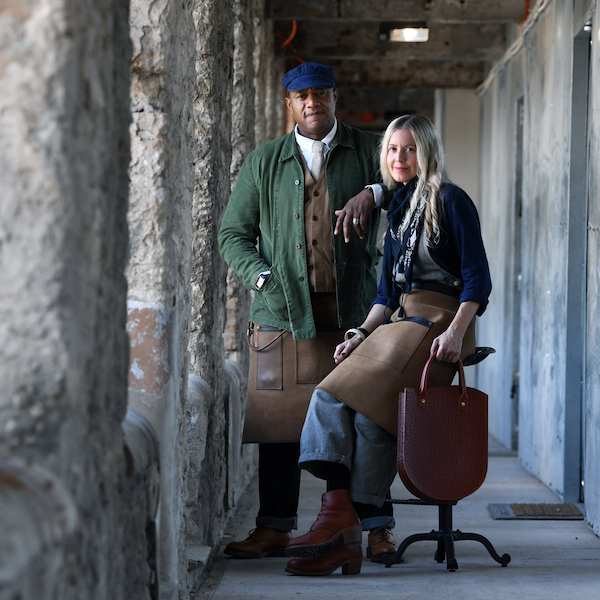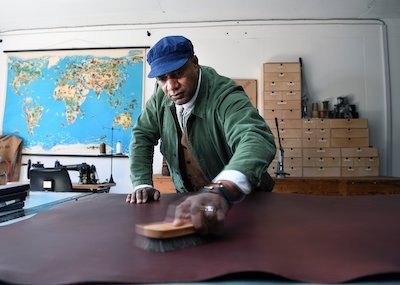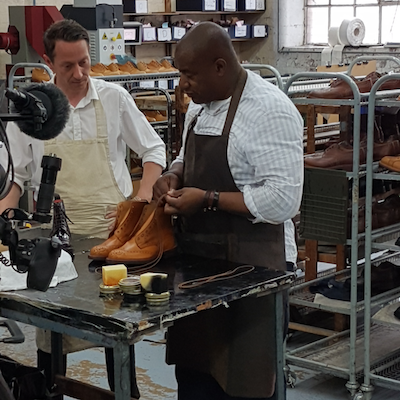You may recogise Jason Stocks-Young as one of the makers from the BBC2 TV series Made in Great Britain, but you may not know that Jason is a fantastic leatherwork tutor too. His popular leatherwork courses have earned him Platinum status in our Students' Choice Awards.
Jason hasn't always been a leatherworker. We caught up with him to ask him all of our burning questions about his career change and what inspires him...

Jason and Louise Stocks-Young
So starting at the beginning, how did you get into leatherwork?
Eight years ago I had a career change, inspired by a move from London to the foothills of the Pennines. I wanted to use my creativity in a more tangible way and started exploring making through furniture restoration and re-upholstery. After a serendipitous meeting with an ex-saddler in Derbyshire I was hooked on leather and I knew it was the route I wanted to go down. I learnt, and continue to learn, from some great leatherworkers who share the same ethos of using traditional methods and high quality leathers. In my Saddleworth workshop I stay true to my original ethos of making all leather goods by hand, with hand-stitching at the core.
''There is a real satisfaction when you’ve designed and hand made a bag that is functional and you know will last a lifetime.''
What is it that you like about working with leather?
I love that leather has such versatility and can be used across such a wide range of products, accessories and interiors. There are multiple techniques such as forming and carving that can bring different dimensions to a piece of leather and applied in unique ways to product design. I also like how each hide has its own characteristics, especially working with vegetable tanned leather, so each item is truly unique.
Is there a particular item that you enjoy making the most?
I enjoy working on bags – I enjoy the whole process from concept, design through to sampling and final product. It’s like a jigsaw, deciding on all the elements, leather type and weight, hardware, stitching width and colour. It constantly evolves and there is a real satisfaction when you’ve designed and hand made a bag that is functional and you know will last a lifetime.

A selection of Jason's handcrafted leather products
And have you got a favourite piece from everything that you’ve made?
My leather apron – it’s one of the first things I made, all hand stitched and it’s aged really well. It was designed for function and I wear it all the time, but it looks pretty good aswell.
Where do you get your inspiration?
My inspiration can come from anywhere, at any time.
My surroundings and visual stimulus are really important to me. My workshop is in old cotton mill in Saddleworth – functional industry always inspires me and it’s filled with an eclectic mix of antiques and artefacts. My daily commute is over Saddleworth Moor so nature is a constant inspiration.

Jason in his studio, wearing his hand made leather apron
You are a much-loved tutor as well as being a maker, why do you enjoy teaching?
Teaching and passing on knowledge is real privilege. I enjoy seeing people change and saying to themselves ‘I can actually do this.’ There is an inner satisfaction about learning and making that has the capacity to improve mental well being.

Are there any hard earned skills or tricks of the trade that you have to keep top secret though?!
Not really, my courses are transparent and I’m happy to pass on the knowledge and tips that have been passed on to me. The internet is a beautiful thing for finding out information, but there is nothing better than learning face to face, as I did.
What are the items that people most often come to you to make?
I’ve tailored the courses to focus on small leather goods in one day, or bags on the two day and three day courses. I also do bespoke one-to-one courses, where I’ve worked on dog collars, watch straps and quivers just to name a few.
And any unusual requests?
That’s easy. I did some leather straps for a replica electric chair called The Old Smokey It was for the foyer of an American company – made in Saddleworth, shipped to the US.
Wow!

How do you divide your time between teaching and producing your own work?
I never turn off the making, whether for my own work or refreshing the products made on the courses. I’m very structured with the course dates, so when I’m not teaching I’m in the workshop designing and making, or on inspiration and research trips.
When producing your own work do you have a schedule that you work to?
I tend to be quite organic in my approach to my own work. I can work quite intensely on a product to get it right, but then might take a break to recharge. I’m also constantly up-skilling so can often spend a lot of time on one specific technique.

Jason Stocks-Young in his studio in Mossley, where he runs courses.
Craft is increasing in popularity and it is great to see lots of TV shows that celebrate our artisans - you recently appeared on Made in Great Britain where you enviably got to try lots of crafts...
How was it trying new skills?
It was a real privilege to be involved in Made in Great Britain. I have a huge appreciation of other makers and their talents so it was a great opportunity to meet like-minded people and share our collective passion for our crafts.
I also think it’s so important to celebrate the great industries that we were renowned for and the places and people that really made them.
Unfortunately most of them don’t exist on the scale they once did, but I’m optimistic of the resurgence in craft and make and new industries that may develop out of this.

Jason with his fellow makers and presenter Steph McGovern
from BBC2 Made in Great Britain
Did any of them really surprise you?
I’d say overall what surprised me was how quickly we had to adapt to the new environments, that was quite a challenge. In my own making I value time and patience in the creation of my pieces. For the series we quickly had to grasp new techniques and then create an item. I think it’s also fair to say that the earlier environments were very challenging to work in. Quite dismal conditions, using rudimentary tools.
What was your favourite part?
Trying my hand at traditional shoemaking at Trickers in Northampton was a bit of a dream come true. As soon as I stepped inside the factory I could sense the dedicated to this great tradition of shoemaking. In particular I loved the bespoke element to the business where each pair of shoes can take up to 3 weeks to make by hand. The skill and craftsmanship is second to none and you could feel the passion and great sense of pride by everyone who works there.
Anything you didn’t enjoy/found difficult?
Although I’m a leatherworker, shoemaking was new to me and very different from my own practice, in particular working with a last and forming over a solid object. There were some similarities in the tools: the awl was a key tool then and still is, and the traditional hand stitching was similar - however my life is made easier now through the use of needles instead of a boar bristle!

Jason learning shoemaking at Trickers in Northhampton as part of
BBC2 Made in Great Britain
And finally, what would be a good piece of advice for someone just starting out?
''Just start. You never know where your journey will lead. Start small, but just start.''
Browse Jason's range of leatherwork courses or visit Diamond AWL >



